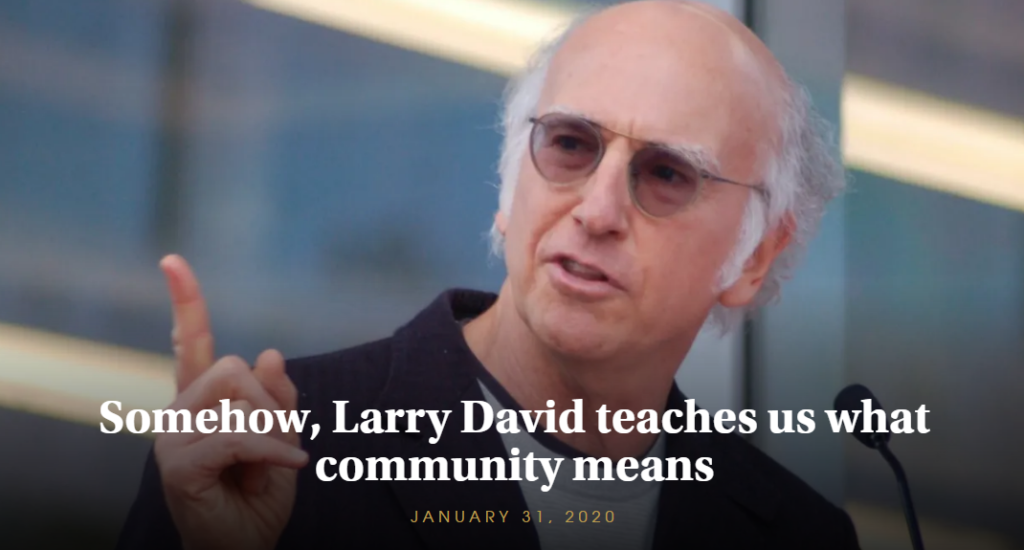
Some weeks ago, my husband and I were walking to church when we observed a peculiar scene: a man in a white Mercedes paused at a stop sign, blaring his horn and yelling at a couple in the car in front. Unwilling to let this man’s impatience disrupt Sunday worshipers, my husband approached the man in the car and demanded he hush. Of course, the curmudgeon turned his ire on us, telling us precisely whose business we could mind. But he did stop honking.
Something worked.
It’s easy to imagine a similar scene occuring in an episode of Curb Your Enthusiasm, of which its tenth season debuted last week. Everyone’s favorite misanthrope, Larry David, certainly would have likely been a bit more invective than my husband in scolding the stop sign offender, but such incidents make for good—if slightly awkward—television.
But with a more critical watch, “Curb” is good for more than just a laugh. It unmasks something crucial in our society: Our desperate need for accountability.
A recurring scene in “Curb” involves LD confronting a person for something selfish—someone cutting in line at a buffet or taking up two parking spaces. He’s become famous for giving voice to what viewers are thinking. Often, bystanders in the show come to LD’s defense, affirming the reprimand of the selfish citizen.
There are some superficial similarities between the way that Larry David operates and the soft, overly-sensitive culture that has sprung up these days as a result of leftist relativism. You might even call Larry a sort of “social justice warrior,” though one with a very particular definition of both “social” and “justice.”
But there are crucial differences at play.
David is a staunch defender of near-universally accepted norms of etiquette that affect people on a day-to-day basis. The principles he invokes are not about controversial and divisive political ideals, but rather, he usually confronts someone because their selfishness has inconvenienced others in a practical way. His call-outs aren’t empty posturing about social politics or a signal to his friends of his self-awareness. He just doesn’t like thoughtlessness, and none of us should.
He just doesn’t like thoughtlessness, and none of us should.
Unlike the knights of social justice raging on Twitter today, Larry David’s confrontations are nearly always in-person, too, which is better for the simple reason that face-to-face scoldings are less likely to happen. The transactions costs are far lower in shooting off a sarcastic tweet than in confronting a real person in the street. So, then, they’re much more likely to happen only when they’re warranted—not at slight and unforeseeable offenses.
It seems that while the angry and political get caught up in the outrage mob, we’ve forgotten all about the most basic niceties that come with being human. We have lost an important respect of the social infrastructure we erected in order to co-exist in the first place. It’s worn down our own understandings of what is necessary to live together in community. The result is a much more fraught society that makes living together unnecessarily difficult. It’s not surprising that, as a people, we are rather divided.
We’re forever trying to rid ourselves of the concept of “norms,” but cultures throughout time and place have had them for a reason. Of course, the mere existence of norms has never been enough to stop people from breaking them. When we do shrug them off, we do so for bad yet widely-accepted reasons. We break them to make a political statement, such as women forgoing bras in the name of social and gender equality. We break them because our selfish impulses overpower our desire to maintain conscientiousness behavior. (We’re rude to a cashier because we’re having a bad day or we fail to hold the door open for the woman behind us at the cafe because we’re too busy thinking about work.) And, ultimately, we do these things because we know that selfishness is the way of our world—and we’ll encounter no objection.
But we need objections from real people, because we ought to be taken to task when we’re actively squashing the community we so desperately need.
That kind of accountability doesn’t need to come from our formal institutions. Yes, our federal, state, and local governments were established to limit the negative consequences of people’s selfishness. Our formal institutions protect us from, and deter, thieves who might want to rob us and companies who might want to defraud us.
Larry David, though neurotic and obsessive compulsive, is on to something.
Yet formal institutions alone are insufficient for a fully flourishing society, because they only address the most egregious examples of human selfishness. Informal institutions and norms, then, ought to take care of the rest. And that’s the way we want it keep it, lest we bring upon ourselves something akin to China’s horrifying Social Credit system. An acerbic Larry David-type is infinitely preferable.
We are individuals, but we’re more than that. We’re people who need other people, and when we shirk our duty to customs, norms, and basic human kindness, we’re insisting we don’t. Though if we’re to find community once more, we need to take each other to task—not for microaggressions, but, rather, for forgetting we’re not islands. Community is equal parts building up when deserved and tearing down when needed.
Larry David, though neurotic and obsessive compulsive, is on to something. Instead of just chuckling at his ridiculous antics, perhaps we should all be taking notes instead.
Alexandra Hudson is a writer, Young Voices Contributor and Novak Fellow based out of Indianapolis. Follow her on Twitter @lexiohudson.